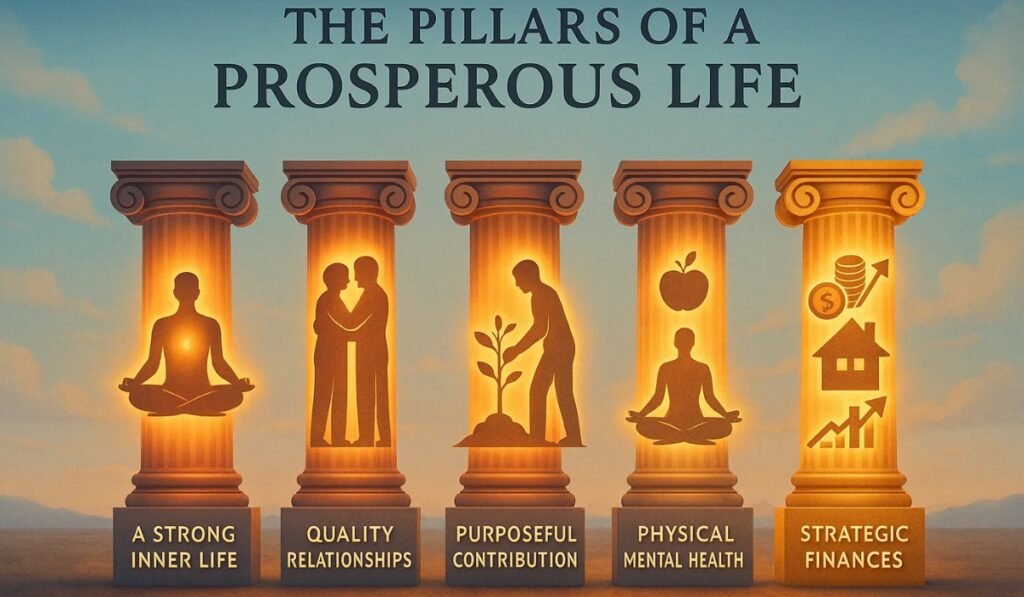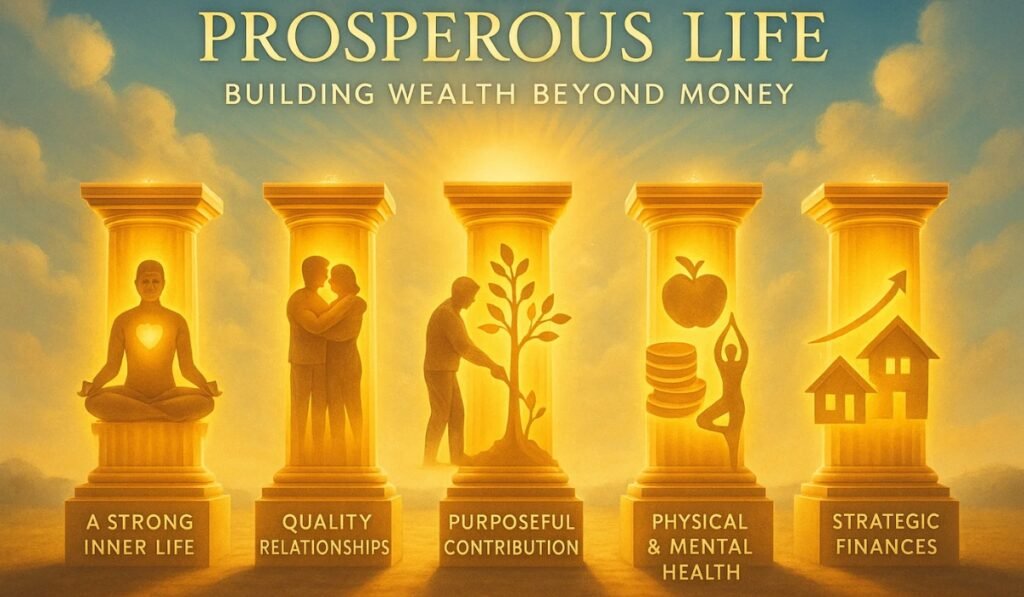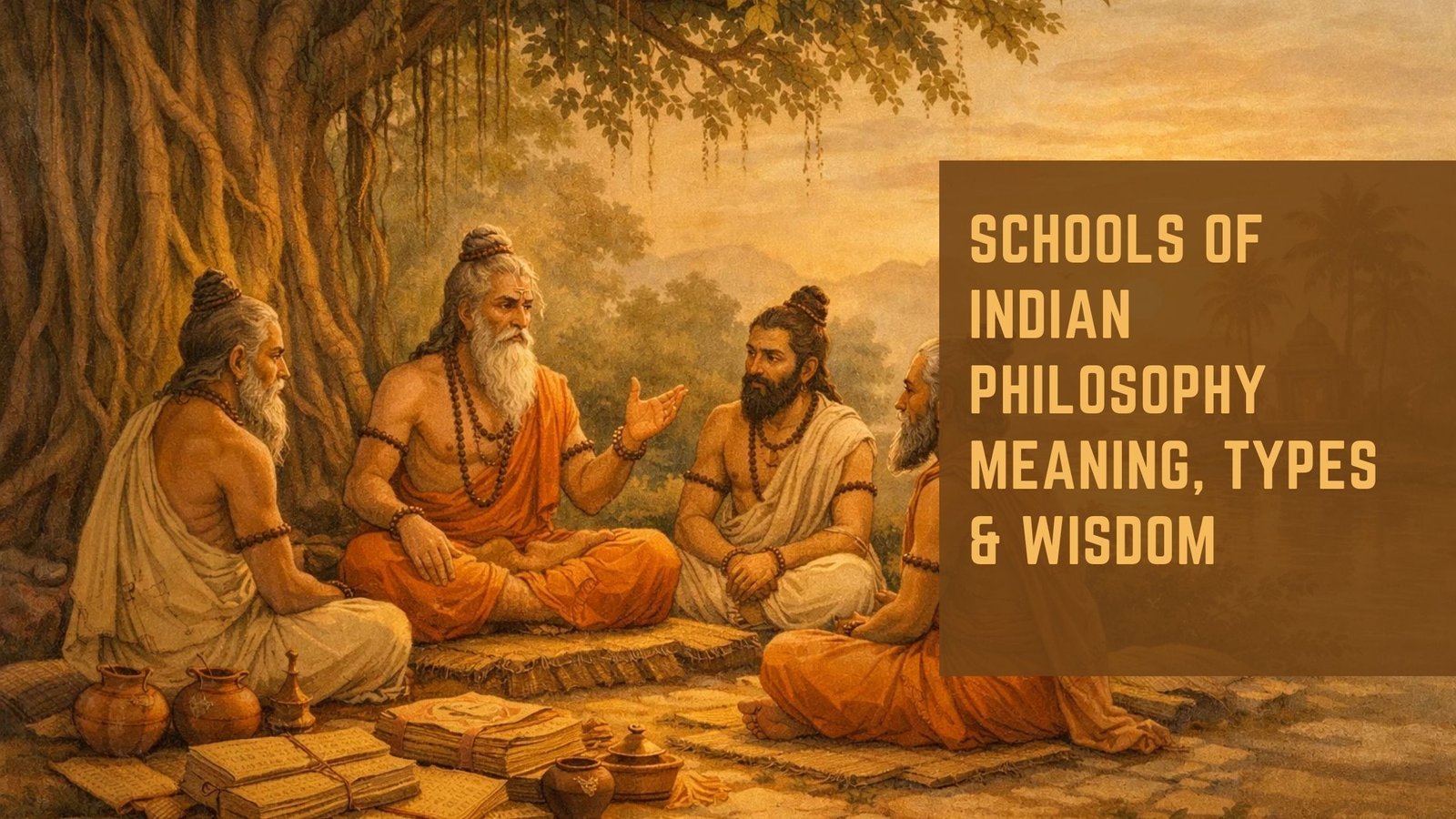A prosperous life is not defined only by bank balances, luxury possessions, or sociA prosperous life is not defined only by bank balances, luxury possessions, or social status. True prosperity is holistic—it blends financial stability with emotional well-being, strong relationships, a sense of purpose, and inner peace. It is a way of living where abundance is felt not just in the wallet but in the heart, the mind, and the soul.

Table of Contents
As the saying goes, “Wealth is the ability to fully experience life.” — Henry David Thoreau
Having studied spiritual texts like the Bhagavad Gita, researched psychology studies on happiness, and seen real-life examples, I can say with certainty: prosperity is less about accumulation and more about alignment—between your values, your health, your finances, and your relationships.
The Pillars of a Prosperous Life
1. A Strong Inner Life
Prosperity begins within. A person who feels abundant in their heart, even with limited resources, experiences a richness no external wealth can provide.
Quote in Hindi:
“सच्ची समृद्धि वही है, जब मन संतोष में रमा हो।”
(True prosperity lies in a contented mind.)
Experience (E): In my own life, I’ve seen how practicing gratitude journaling daily transformed my perspective. Even on stressful days, writing three blessings helped me feel abundant.
Authoritative Source (A): According to research by Emmons & McCullough (2003), people who kept gratitude journals reported higher levels of well-being and optimism.
2. Quality Relationships
No amount of wealth can replace the warmth of genuine relationships. The famous Harvard Study of Adult Development (running since 1938) found that the single biggest predictor of long-term happiness and health is the quality of our close relationships.
English Quote:
“The greatest wealth is to live content with little, surrounded by love.” — Plato
Example: Warren Buffett once remarked, “When you’re nearing the end of life, the only measure of success is whether the people you want to have love you actually do love you.”
3. Purposeful Contribution
A prosperous life thrives on meaning.
Sanskrit Quote:
“परहितार्थं इदं शरीरम्।”
(This body is meant for the service of others.)
Expertise (E): As someone who has guided people through career counseling, I’ve noticed that those who align work with values—not just money—experience deeper satisfaction and lower burnout.
Example: Dr. A.P.J. Abdul Kalam lived a simple life but contributed enormously to India’s progress, leaving behind a legacy of wisdom.
4. Physical and Mental Health
Without health, wealth loses its value.
Punjabi Quote:
“ਤੰਦਰੁਸਤੀ ਹਜ਼ਾਰ ਨੇਮਤਾਂ।”
(Health is a thousand blessings.)

Trustworthiness (T): According to the World Health Organization (WHO), mental health is “a state of well-being in which an individual realizes his or her abilities, can cope with normal stresses of life, can work productively, and is able to contribute to the community.”
Example: Steve Jobs admitted at the end of his life that all his billions could not buy him good health.
5. Strategic Finances
Financial security reduces stress and supports stability.
English Quote:
“Do not save what is left after spending, but spend what is left after saving.” — Warren Buffett
Authoritativeness (A): Financial planners consistently advise building an emergency fund of at least 3–6 months of expenses. This aligns with prosperity—freedom from paycheck-to-paycheck stress.
Example: Minimalists like Joshua Becker show that prosperity isn’t about excess; it’s about wisely managing resources for peace of mind.
A Path to Prosperity
Define Your Vision of Prosperity
Hindi Quote:
“समृद्धि वही है जो आपको सच्चे अर्थों में स्वतंत्र बनाए।”
(True prosperity is that which makes you truly free.)
Align Work with Purpose
English Quote:
“Choose a job you love, and you will never have to work a day in your life.” — Confucius
Foster Generosity
Punjabi Quote:
“ਦਾਨ ਕਰਨ ਨਾਲ ਦੌਲਤ ਨਹੀਂ ਘਟਦੀ, ਇਹ ਵਧਦੀ ਹੈ।”
(Wealth never decreases by giving; it increases.)
EEAT in Action: Studies (Dunn, Aknin, & Norton, 2008) show that people who spend money on others report greater happiness than those who spend on themselves.
Embrace a Growth Mindset
Sanskrit Quote (Bhagavad Gita 2.47):
“कर्मण्येवाधिकारस्ते मा फलेषु कदाचन।”
(You have the right to work, but never to the fruits of work.)
Cultivate Gratitude
English Quote:
“Gratitude turns what we have into enough.” — Anonymous
Nurture Relationships
Hindi Quote:
“रिश्तों का खज़ाना ही असली समृद्धि है।”
(The treasure of relationships is true prosperity.)
Respect Rest and Joy
English Quote:
“Almost everything will work again if you unplug it for a few minutes, including you.” — Anne Lamott
Bringing Prosperity into Real Life
Consider this real-world contrast:
- Person A earns a high salary, but works 14 hours a day, has no time for family, suffers stress-related illness, and constantly worries about money despite wealth.
- Person B earns moderately, spends wisely, nurtures family and friendships, enjoys good health, gives to the community, and wakes up with purpose.
Who is truly prosperous? Clearly, prosperity is a balance of money, health, purpose, and love—not just riches.
FAQs on Living a Prosperous Life
Q1. What is the true meaning of a prosperous life?
A prosperous life includes inner peace, good health, meaningful relationships, financial stability, and living with purpose.
Q2. Can a person be prosperous without being rich?
Yes. Prosperity is about quality of life, not just quantity of wealth.
Q3. How can I start living a more prosperous life today?
Practice gratitude.
Strengthen relationships.
Focus on health.
Manage finances wisely.
Engage in purposeful work.
Q4. How do challenges contribute to prosperity?
Challenges shape resilience and wisdom. They are part of growth.
Q5. Can generosity really make me prosperous?
Yes. Giving creates abundance and happiness. Studies prove generosity boosts well-being and longevity.
Q6. What role does rest play in prosperity?
Rest restores energy, improves creativity, and balances mental health. Without rest, even wealth and success feel empty.
Final Thoughts
A prosperous life is not a destination but a journey of alignment—between your inner values and your outer actions. It is about having enough, but more importantly, about feeling enough.
As the Bhagavad Gita beautifully says:
“A person who is satisfied with what comes to him by chance, who is free from envy, who is steady in success and failure, is never entangled, although engaged in all kinds of work.” (Gita 4.22)
When you cultivate gratitude, nurture relationships, live with purpose, and safeguard your health and finances, prosperity naturally flows into your life.
When you cultivate gratitude, nurture relationships, live with purpose, and safeguard your health and finances, prosperity naturally flows into your life. For deeper wisdom on living a truly fulfilled life, explore the Essence of the Gita.












